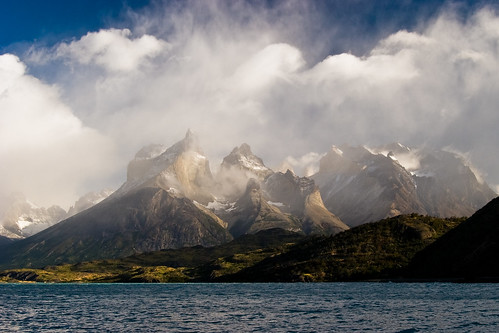
with permission, Andres Diaz, Cuernos del Paine, February 2008
I remember vividly when my boyfriend first told me he was “going to take me to the most beautiful place in the world.” At the time, I thought that he was either a hopeless romantic or that he was practicing some great pick-up lines.
A mere six months after our wedding I found myself mentally eating those badly chosen words as I emerged from a dirt road surrounded on both sides by patches of dusty raspberry bushes and dense green foliage to one of the most beautiful vistas I've ever seen, yellow-green fields rolling down to a intensely blue lake with a snow-capped volcano on the opposite shore.
 |
| From Vacation Chile 2003-2004 |
It was my first trip to Chile, and I had to agree with my husband, we had arrived at the most beautiful place I'd ever seen.
However, there was a downside to this discovery of a Latin American Shangri-La. Since my husband's family owns property on the shores of this lake with the incredible view of Volcan Villarrica, I rarely get to go anywhere else when we travel there.
My husband, who has over one million miles of airtime with American Airlines and nearly the same with United, doesn't want to travel when he goes on vacation. He wants to arrive at the most beautiful place in the world and stay there.
I, however, suffer from wanderlust. Since we married in 1987 I have seen the capital of Chile (Santiago), the seaside city of Viña del Mar, the family fundo (farm) on the banks of Lago Villarrica, and not a whole lot else, apart from some sides trip in the lakes region to Frutillar, a German-style village on the shores of Lake Osorno, the exquisite emerald green Lago Todos los Santos, and the port city of Puerto Montt.
But in the back of my mind there has been one part of Chile that holds a kind of magical appeal for me: Patagonia.
Chile is full of places named in the language of the native Mapuche people that roll off the tongue and make you want to see the location that gave rise to such linguistic invention. My favorite is the little town of Panguipulli, which is pronounced “pan-gi (hard “g”)-pu-yee), and means hill of the lion or puma. Set on the shores of Lake Panguipulli, you can see that the residents have a sense of humor about their town's name – the local panaderia sells “Pangui-pan.”
 |
| From Vacation Chile 2003-2004 |
So it's no wonder that Patagonia has held a special appeal for me, one that I felt even before I met my husband and was immersed in Chilean culture. Patagonia is a kind of utopia, a “no-where” land, a place so large and sparsely inhabited that one of the largest volcanic eruptions occurred in the far north of Patagonia in August 1991, and almost no one noticed.
According to the venerable Oxford English Dictionary, there are at least three viable speculations about where the word Patagonia comes from. One of them argues that it derives from the Spanish word patagon meaning “a large clumsy foot,” since the Spaniard Magellan thus named the deep footprints of natives dancing in the sand when he first stopped on the southernmost shores of South America.
A second and more unlikely theory links “Patagonia” to the Incan word, Patac-Hunia, for “mountain regions.”
The third explanation, and my favorite, again links Magellan to the origins of the word but this time attributes it to Magellan's description of some of the natives who were wearing “dog-faced” masks. A popular novel of Magellan's time, Primaleon of Greece, featured a dog-faced monster named Patagon. This was the same text that gave rise to Shakespeare's equation of the native character Caliban with a “puppy-headed monster” in his play The Tempest.
Dick Lutz, author of Patagonia: At the Bottom on the World, points out that Patagonia is referenced with surprising frequency in Western literature, appearing in works by Shakespeare, Lord Byron, Jules Verne, Herman Melville, Sir Conan Doyle, Edgard Allen Poe, and of course, Coleridge's famous poem, “The Ancient Mariner.”
So for me, as a student of literature, and as one long fascinated by the name and the idea of Patagonia, the land at the end of the earth, there could not be a more felicitous intersection of circumstances. In 2010 I am determined that my sojourn in Chile will not be bounded by the shores of Villarrica, however lovely they may be, and I will keep my readers apprised of all that I learn as I read more about and continue to dream of wandering through wilds of Patagonia.

No comments:
Post a Comment